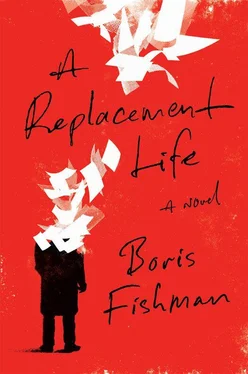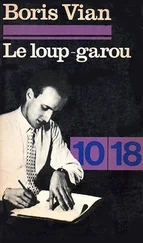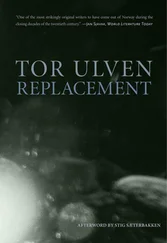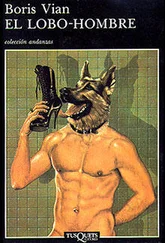man reached for the glass, as if his thirst were not pressing. Once he had taken a sip, the juice barely touching his lips, the barman vanished, the bar the postman’s alone. He unfolded a newspaper, and both Slava and his father thought they could hear the snap of its crease before it landed next to the juice. Slava’s father looked down at his son and smiled in a resigned, fatal way.
“Mr. Gelman!” Slava heard through the noise of the bar. Otto was barreling toward him like a castaway. “Well, it is you,” he said proudly on reaching Slava.
“You can call me Slava,” Slava said.
“My assistant says it’s a name with great meaning,” Otto said. He pumped Slava’s hand and even bowed slightly. “She’s also a Soviet émigré,” he hastened to explain. “Lyudmila. Please, Mr. Gelman — Slava, excuse me — let us not stand here like guests.” He extended his arm toward the back of the bar, where the bartender had placed a coaster over Otto’s glass.
“What is your poison?” Otto said as he lowered himself in his chair. “Did I say it correctly? As promised, I am buying.”
Slava looked up at the bartender, but he was experimenting with the foam on a Boddington and had no interest in their conversation. Not to prolong matters, Slava asked for the Boddington, but in his nervousness, he elbowed it onto the bar. When he looked up apologetically, the bartender only shrugged. “I’ll practice the perfect Boddie till kingdom come,” he said. “You’ll have to pay me again, though.”
“I will pay,” Otto shouted. The bartender, mopping up the spill with a dirty towel, looked up at the odd pair before him. Otto waved him away. “Mr. Gelman, I will tell you a story,” he said. “One time my father and I met for tea. I had just finished university — I was struggling to find a direction for my life. It is a problem for all men at twenty-two, but in our country, with a father like mine — you understand. He was a serious man, a strict man, but in the most positive sense, and he believed that the value of going around without a goal, well, it was nil. Better to file the same bolt over and over at the motor factory, not that he was a great admirer of such things, than wander the streets and drink coffee and think about — what?
“Anyway, we met for tea. I was wearing yellow running shoes! Oh, it was the 1970s, and I imagined myself an adventurous person, but how foolish to meet your father for a discussion about the direction of your life in yellow running shoes!” Otto slapped the bar, delighted at his callowness.
“Anyway, I was so nervous. The waitress brought over the tea in these two very attractive small pots, and what did I do? I spilled the whole pot in my lap. All over my yellow shoes, all over my jeans, so it looked like — excuse me — like I went to the bathroom.” Otto hiccuped from the beer and apologized.
“I think it is taking all of my father’s power not to shake his head. I excused myself and went to the bathroom to wash up. And in that time the waitress had brought a new pot of tea — for free, I would like to add, Mr. Bartender, ha-ha! No, I am joking, it is okay. And what happened then, Mr. Gelman? Can you guess?” Otto’s eyes sparkled with anticipation.
“You spilled the tea all over again,” Slava said grimly.
“That is correct!” Otto shouted. “That is so very sadly correct. You see? You are a storyteller. You know how it ends. But also it doesn’t end that way!” He wagged his finger. “My father rose from the table, and I thought, He is going to walk away in disgust. I could see the waitress laughing behind the bar. But he took me by the shoulders. And he said: Ich bin fertig aber dir gehört die Welt. Sei dir selbst treu .” Otto gleamed at Slava as if they spoke the same language. Finally, he relented and translated: “‘I am a finished man, but you have the world. Be true to your own strange kind.’ It was lines from literature. Did I think my father read a single page of literature in his life? No!” Otto looked off and recited: “‘I am a finished man… But you are quite a different matter: God has prepared a life for you… Become a sun and everyone will see you. The sun must be the sun first of all.’”
He turned back to Slava. With bewilderment, Slava realized Otto was waiting for an assessment of his performance. Slava mumbled a compliment. Otto nodded demurely.
“Mr. Gelman, my position is, how do you say”—Otto made the motion of cuffed wrists—“but at sixty-five, you are free. With a nice state pension. I will not say this even to my wife, but I will say it to you: There is a book inside me. Maybe there is some advice, even, you can give me. Isn’t this the biggest task of them all? To organize these thoughts running around inside us, to stop the river of time just one second?” He shook his head tragically.
“I can hardly help you if I have no idea what’s going on,” Slava said, trying to sound casual as he delivered the line he had practiced so many times. What he really wanted to know was why he was sitting there if he wasn’t the accused, and how Otto knew so much about him, but that he couldn’t ask. He counseled himself patience.
“Pathetic,” Otto said, shaking his head. “I would much rather speak with you about life and the books we can write than… Maybe it’s because I am nervous? I’m telling you, this is not exactly what I do every day.” He held up his hands. “This”—he moved his finger between them—“was not in my job description. Do you want to see the job description? It says: ‘Boring, boring, boring. Paper, paper, paper.’” He laughed. “So, when this arrived on my desk, I confess to you, I was quite excited. I hope you understand I am not playing light with the subject, it’s just exciting sometimes to step outside your skin and play Sherlock Holmes.”
“And what do you do?” Slava said. From another table, a chorus of cheers marked the downing of a whole liter in one go.
“Me?” Otto’s expression became serious and sad. “I try to make it so the money comes more quickly for the old people. Sometimes this one paper becomes lost in the channels, or this office is on vacation, and for no very good reason, the old Russian Jewish person here in America is waiting for money and thinking the worst things about the Germans — again. So in this small way…” Otto trailed off. He had a broad, kind face, almost square, the jaws pressing out of the skin, academic in the thin owlish glasses perched atop a broad ex-boxer’s nose. In surface area, it bested a Jewish nose, but the shape was non-Semitic. Jewish noses amplified vertically, while Aryan noses metastasized sideways.
“Here is the complication, Mr. Gelman,” Otto said almost apologetically. “Germany is a democratic country. Sometimes too much so. But it is all a reaction to — to what was. Regardless, it is a democratic country, with some parliament members positioned against this law. Not because they are anti-Semitic, Mr. Gelman, don’t rush to conclusions. Simply, they say that because of all the documents destroyed by the Nazi soldiers, and all the documents that the Russian authorities will never share, proof is impossible. So, the restitution program, it is almost asking for fraud. There is a way to give reparations, but this is not it.”
“And what is?” Slava said.
Otto spread his hands. “I don’t know, Mr. Gelman. I am not in the law-making mechanism. But I would like to do my part to prevent Herr Schuler from Niedersachsen from saying, ‘I told you so.’”
“And this—” Slava said.
“This equals ‘I told you so,’ yes,” Otto nodded. “Because I have this report. My professional obligation is to investigate the report. If I come to zero, I have no choice but to make a declaration to Herr Schuler, who runs the committee in parliament. And then Herr Schuler has a press conference in front of the Reichstag, and then there is no telling what will be the result. You can probably say kaput to this new proposal for expanded eligibility, that’s what. Not to mention some legal consequences for the guilty person. But if I can find the results by myself ”—Otto poked himself in the chest—“well, it couldn’t be more simple. We take them out. ‘Internally handled’ is the phrase. It never happened. If the person who is doing this gives up the fake ones, he can save the ones who are real. Or she, or she,” he hastened to add. “In this time, we must be politically correct about identities of criminals also, ha-ha.” He leaned forward with coppery breath. “But you know what, Mr. Gelman? I don’t care who’s doing this. Herr Schuler is a rigid donkey. And what Herr Schuler doesn’t know isn’t going to murder Herr Schuler in his sleep.”
Читать дальше











